The NHL's Global Series, which saw four teams fly to Stockholm last week to compete in two games each over a four-day period, almost immediately transformed into The William Nylander Experience. The dude was everywhere.
Nylander was the main attraction on the ice, racking up five points (including an overtime goal) in the Maple Leafs' two victories. Off the ice, the Calgary-born Swede was in full rock-star mode, appearing on local TV talk shows, answering questions about IKEA, and signing countless autographs.
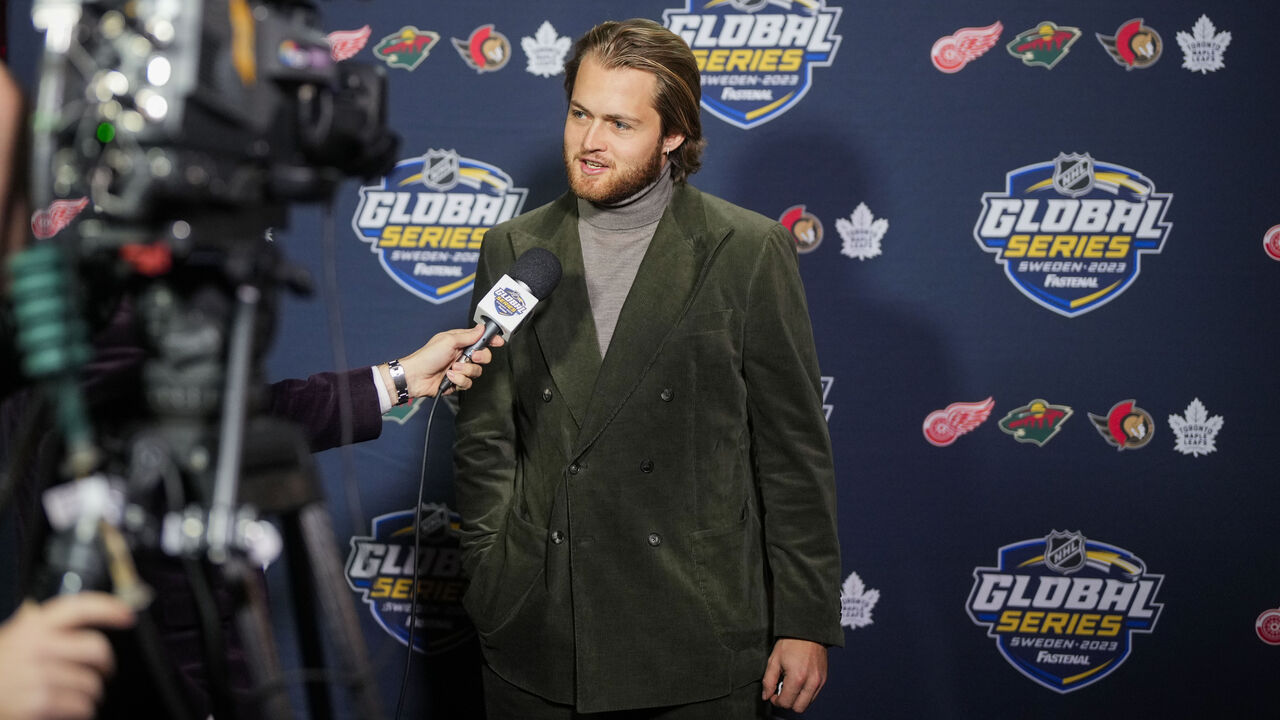
The trip was an exclamation point to a mammoth start to the season for Nylander, who enters Friday's Toronto-Chicago matinee with at least one point in all 17 Leafs games. He's top 10 in goals (12) and points (27).
The Leafs say they want to re-sign Nylander, a pending unrestricted free agent, and Nylander says he wants to re-up. The winger's agent and Toronto's front office continue to negotiate, according to reports. So there's a deal to be made between now and July 1, when Nylander becomes a UFA.
Let's assume that Nylander, who turns 28 in May, cools off from his 130-point pace and finishes the season with 90-100 points.
Considering his age, position, and production history - and external factors like a rising salary cap - what's a fair projection for his next deal?
"On a seven- or eight-year term, he's around $11 million a year," said Kyle Stich of AFP Analytics, a consulting firm specializing in NHL player valuation.
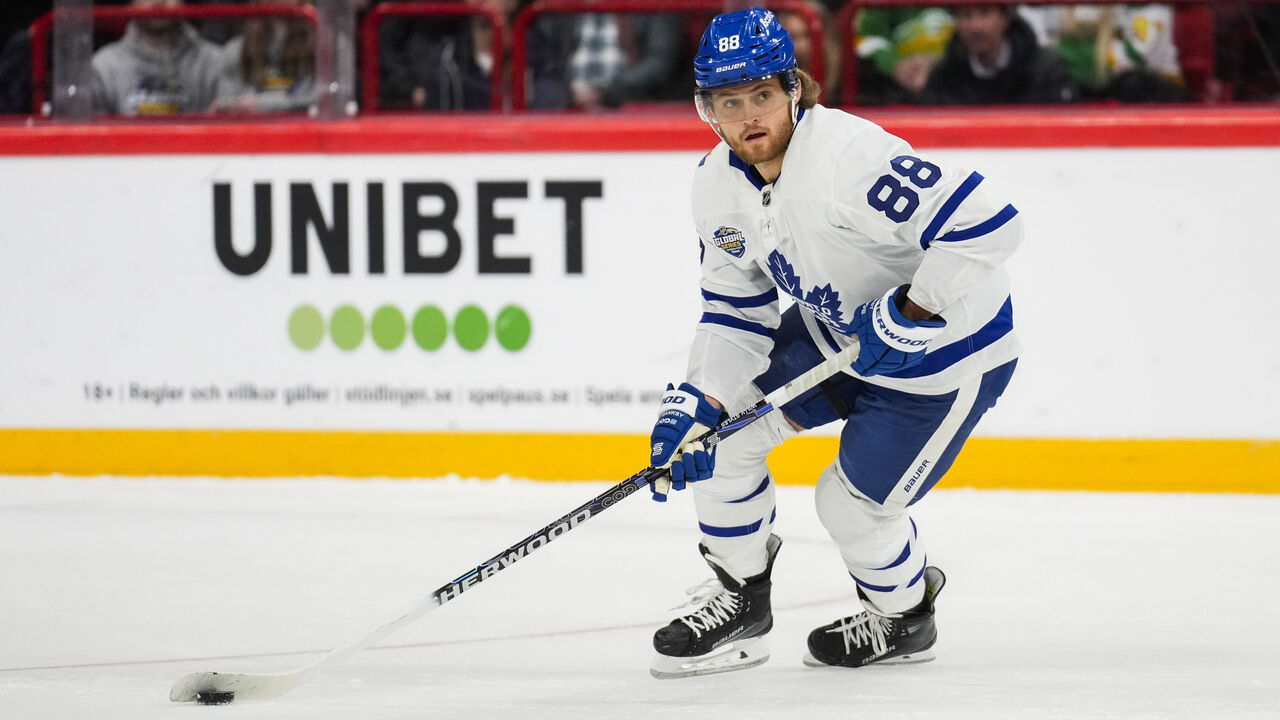
Stich's ballpark projection is significant for two reasons.
One, it's a sizeable jump from AFP's preseason projection for Nylander's extension, which came in at $9.3 million per season over seven years, for around $65 million total. Two, $11 million a year slots Nylander just ahead of Jonathan Huberdeau and just behind David Pastrnak - both high-profile wingers who signed eight-year extensions in the past 15 months.
Pastrnak's making $11.25 million a season in Boston, and his average annual value accounted for 13.6% of the total cap at the time he signed, according to CapFriendly. Pastrnak was 27 when his current deal kicked in.
Huberdeau's making $10.5 million in Calgary. His AAV accounted for 12.7% of the total cap at signing time, and he was 30 when his deal began.
Stich's $11 million Nylander AAV projection would account for 13.2% of this year's $83.5-million cap and 12.5% of next year's estimate of $87.7 million.
What does all of this mean? Nylander's earned himself a double-digit AAV, and the Leafs may want to wait a minute before committing to any specific contract details. Nylander's value (and leverage) is at an all-time high, which is fantastic for him but not great for managing the cap sheet.
Vasilevskiy fear factor
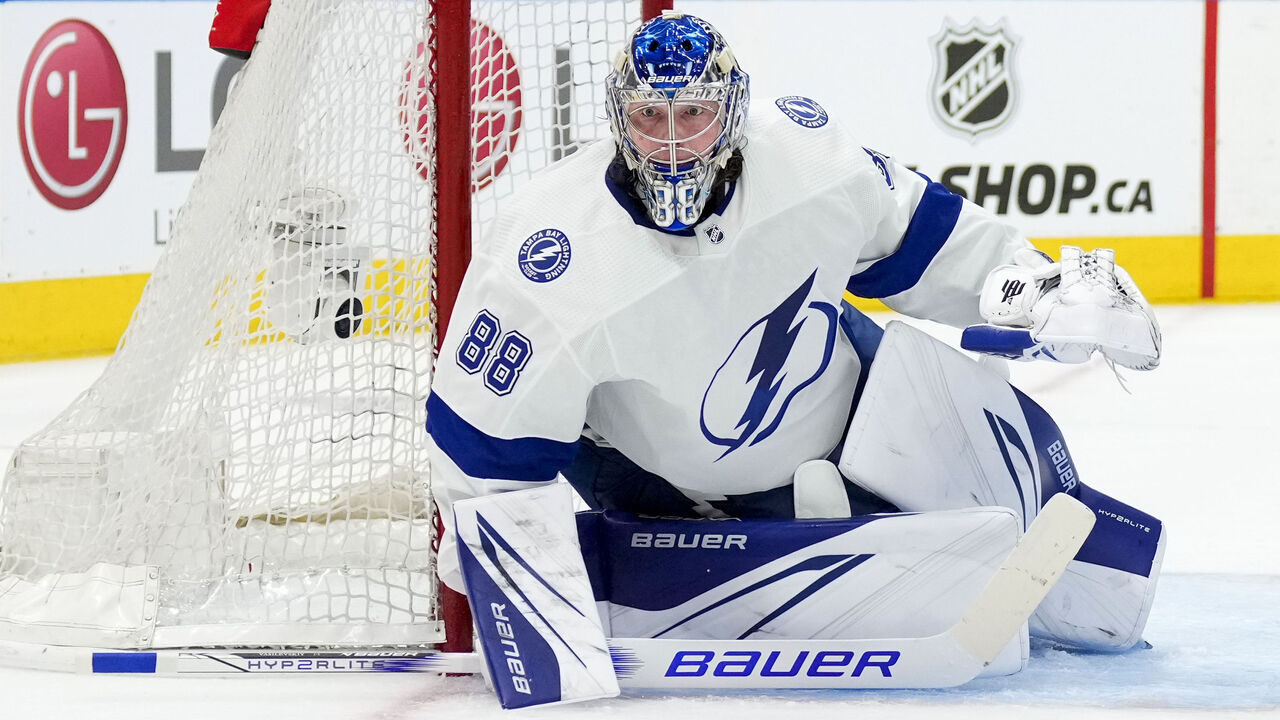
Coming out of the offseason, the "Who's the best goalie in the world right now?" debate had juice to it. Ilya Sorokin, Igor Shesterkin, Andrei Vasilevskiy, Connor Hellebuyck, Juuse Saros, and Linus Ullmark all qualified as fair picks.
Yet when Associated Press hockey writer Stephen Whyno and I posed that question to a dozen NHL skaters at a preseason media event in Las Vegas in early September, one name was uttered repeatedly.
"Gotta go with Vasilevskiy," Canucks captain Quinn Hughes said.
"Probably Vasilevskiy," Blue Jackets forward Johnny Gaudreau said.
"I think it's still Vasilevskiy," Red Wings captain Dylan Larkin said.
Vasilevskiy, a two-time Stanley Cup champion and winner of the Vezina and Conn Smythe trophies, wasn't the unanimous pick in our (admittedly small) survey. But he received the majority of full votes and a few partial ones.
The level of respect was notable given the various options for top goalie, and the facts: Vasilevskiy's 29, entering his 10th season, and had a down year by his standards (.915 save percentage and an early playoff exit).
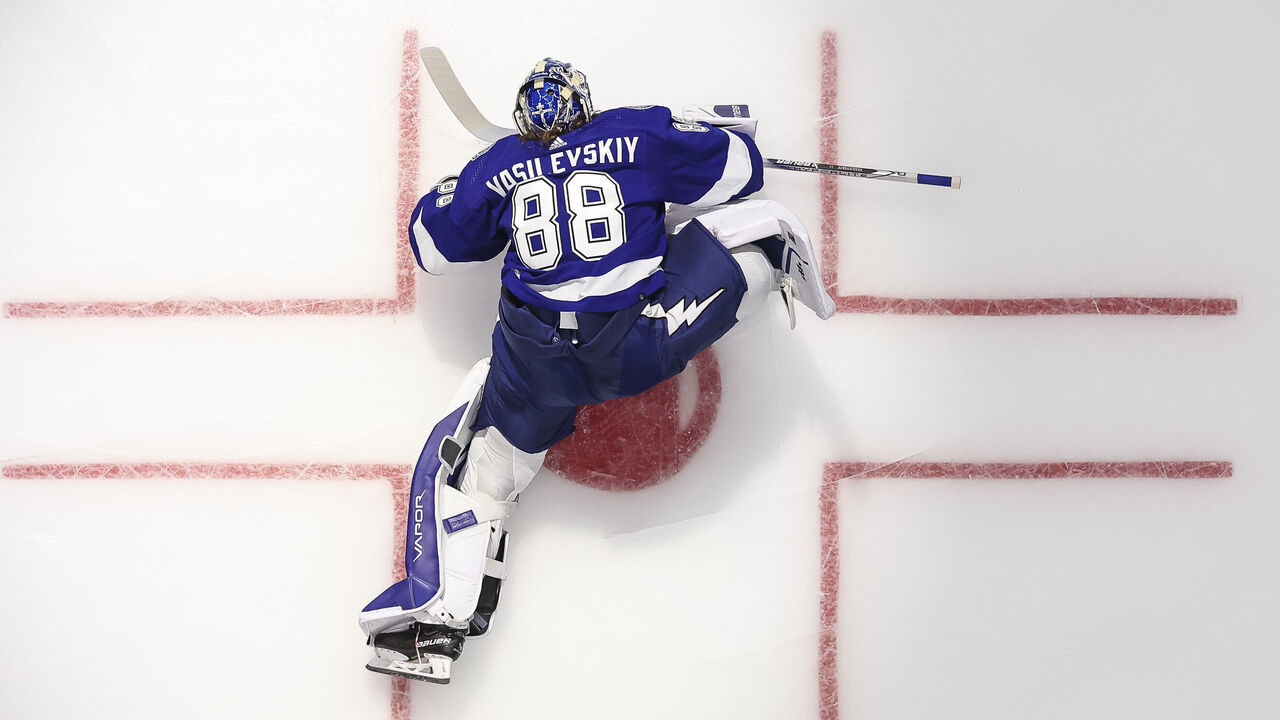
"You look at him and you see no net," Canadiens sniper Cole Caufield said about the 6-4 and freakishly athletic goalie. "That's what makes him so special - that he's still able to move and be quick in that way. It's frustrating as a shooter, but you've got to beat him off the pass almost every time."
Two weeks after the Vegas media event, the Lightning announced Vasilevskiy had back surgery and would miss "approximately the first two months" of the regular season. The team didn't expect any long-term issues, assuring its fan base Vasilevskiy would return to the crease his old self.
Tampa Bay head coach Jon Cooper told reporters Wednesday "there's a really good chance" Vasilevskiy debuts sometime over the next week.
The Lightning are 9-6-5 with the unheralded goaltending duo of Jonas Johansson and Matt Tomkins combining for an .888 save percentage, which ranks tied for seventh worst in the NHL. They survived, but are ready to welcome back the big Russian.
Shooters, on the other hand: not so much.
"You start to second-guess where to shoot because of how big he is and how good he is," Devils superstar Jack Hughes said.
"Pucks hit him when he can't see it," Larkin added. "You get him looking at the puck, squared up at you, and it's hard to score on him."
Kraken 'comfortable' with Wright's path
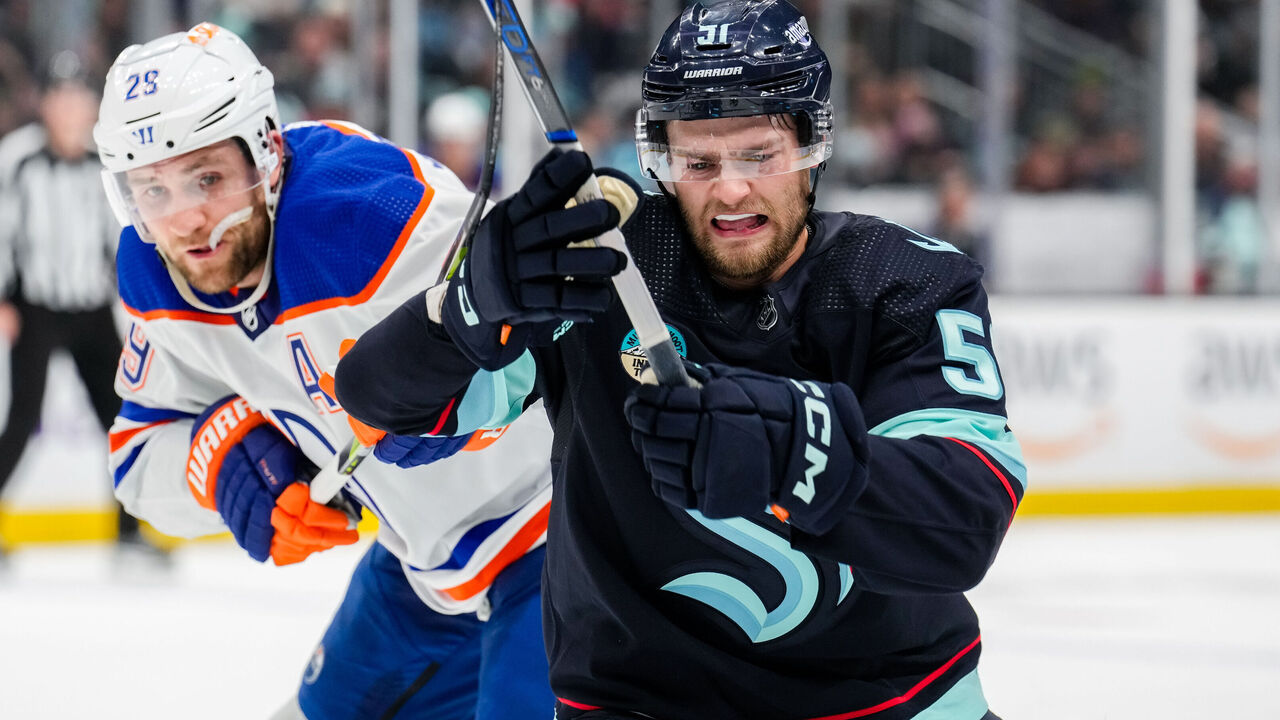
Juraj Slafkovsky. Pavel Mintyukov. David Jiricek. Logan Cooley. Matthew Poitras. Kevin Korchinski.
All six of those 2022 draftees have appeared in more NHL games than Shane Wright, the presumptive first pick heading into draft night in Montreal, who dramatically slid to the Kraken at No. 4. The right-handed center turned pro last season but so far has logged only 97 minutes over 11 NHL games.
"We're comfortable with where he is, and I think he's got a bright future with our organization," Kraken general manager Ron Francis said last week.
Wright's 2022-23 was a tornado of healthy scratches, demotions, promotions, and fleeting highs. When it was over, he'd competed in eight regular-season games for Seattle; 32 regular-season and playoff AHL games for Coachella Valley; 24 games for OHL Windsor; and seven world-junior games for Canada en route to a gold medal.
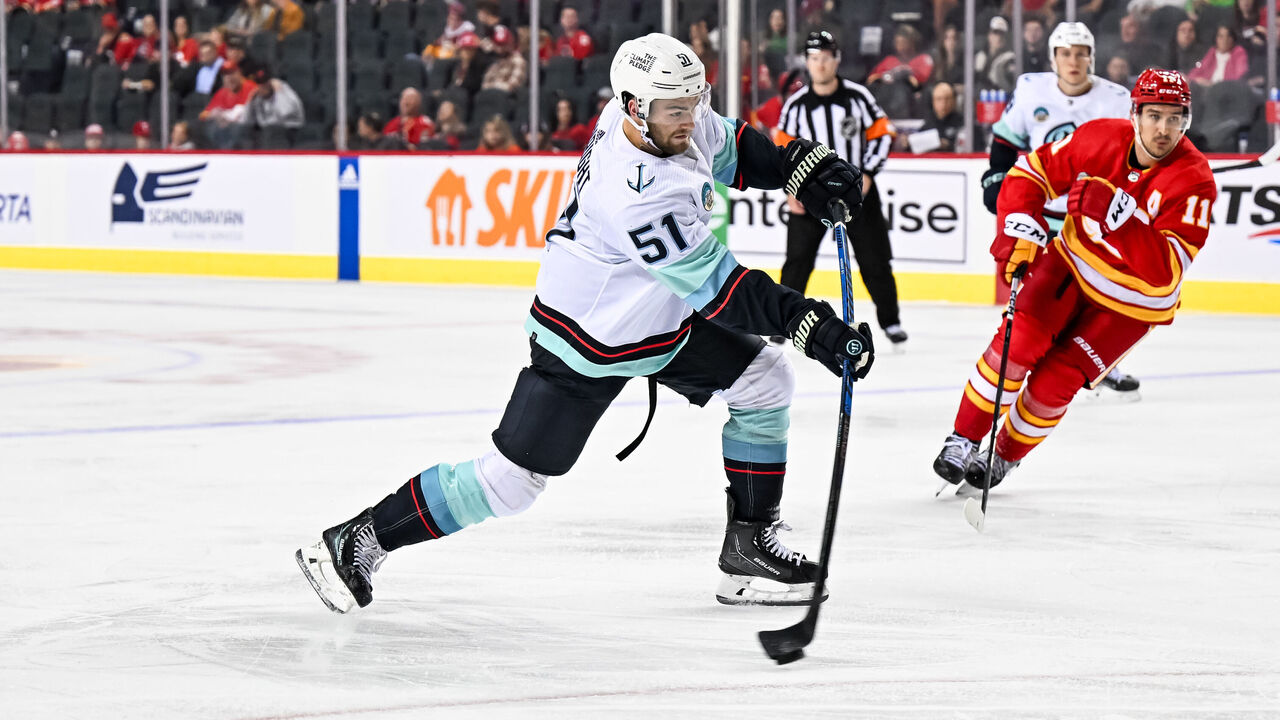
A strong skater with a bullet of a shot, Wright collected 64 points in those 71 games - a solid yet unremarkable year-end tally given the varying competition.
This season, Wright's split his time between the NHL (three games, no points) and AHL (11 games, nine points). He remains a work in progress, and is still eligible for the world juniors, though he's unlikely to be loaned to Canada.
A recent area of emphasis with Wright: his play with the puck. Specifically, puck management in the neutral zone and decision-making in the offensive zone.
"We're trying to get him to have that (shoot-first) mentality," Francis said. Wright's off to a promising start as an AHL sophomore with six goals. He's averaging 2.9 shots on goal per game, up from 2.2 in 2022-23.
Squint hard and you start to see the "bright future" Francis envisions.
Parting shots
Dual threat: Artemi Panarin's a changed man - and, no, I'm not talking about the 32-year-old's newly shaved head. Panarin's unexpectedly evolved into a dual threat for the 13-3-1 Rangers, resulting in 26 points (10 goals, 16 assists) through 17 games. A hardcore pass-first winger his entire career, Panarin's shot rate has skyrocketed to 24.7 attempts per 60 minutes under new coach Peter Laviolette. (He finished between 13.5-17.3 per 60 in his previous eight seasons.) Maintaining puck possession for long stretches is still Panarin's bread and butter, but he's starting to incorporate more one-touch passes and shots to keep defenders guessing. In turn, Panarin's per-60 giveaway rate has fallen from 3.8 last year to 2.0.
Through the first 20 #NYR games of the season last year, Mika Zibanejad was leading the team with 86 shots on goal.
— Jonny Lazarus (@JLazzy23) November 22, 2023
Through 16 games this season, he has 44 shots on goal.
Artemi Panarin has 66.
International hockey: We don't know everything about the proposed international tournament being staged by the NHL in February 2025, but I'm psyched based on what we do know. Finally we'll see Connor McDavid, Auston Matthews, and Co. compete for their countries. Personally, I wish more than four teams were involved so it could be a true best-on-best showcase, and I wish the tournament was longer than a week, but beggars can't be choosers. The big-picture takeaway: the NHL gives a damn about international hockey again. Hopefully this 2025 event will be followed by the 2026 Olympics, 2028 World Cup, 2030 Olympics, etc. Momentum is key.
last time we saw matthews or mcdavid in an international best-on-best tournament they looked like this and played for a made-up team. they're both 26 now. pic.twitter.com/MH82BMZEKA
— szoboszlai fan account (@OVECHKlN) November 20, 2023
Goalie shopping: The Oilers are already well into the "desperate times call for desperate measures" stage of their disastrous season. They need a new goalie. Ideally, the front office would try to land a bona fide starter like Saros, John Gibson, or Jordan Binnington. Problem is, each makes $5 million or more, which is way too much for cap-strapped Edmonton. In Gibson's and Binnington's cases, their teams are playing fairly well.
A few more realistic targets include Semyon Varlamov (Islanders), Jake Allen (Canadiens), and Karel Vejmelka (Coyotes). Vejmelka, 27 and making $2.725 million this season and next, is the most intriguing of the trio. While Arizona's trending up and may see Vejmelka as its goalie of the future, if the Oilers offer a package that accounts for their desperate state, Coyotes general manager Bill Armstrong would be foolish to not pull the trigger. He'll thank himself later.
Current SV% among Oilers goalies
— local man (@TeacherofPuck) November 21, 2023
Calvin Pickard: 0.875
Stuart Skinner: 0.873
Jack Campbell: 0.873
Reader PSA: While I've got a Google Doc filled with content ideas for this biweekly notebook and continue to brainstorm new ones throughout the season, I'm ultimately here to serve you, our readers. So, what do you want to read about? Is there a question you'd like me to ask an NHL player or coach? Is there a league- or team-related trend you want me to dig into? Send me a note through email (john.matisz@thescore.com) or X/Twitter (@MatiszJohn).
John Matisz is theScore's senior hockey writer.
Copyright © 2023 Score Media Ventures Inc. All rights reserved. Certain content reproduced under license.